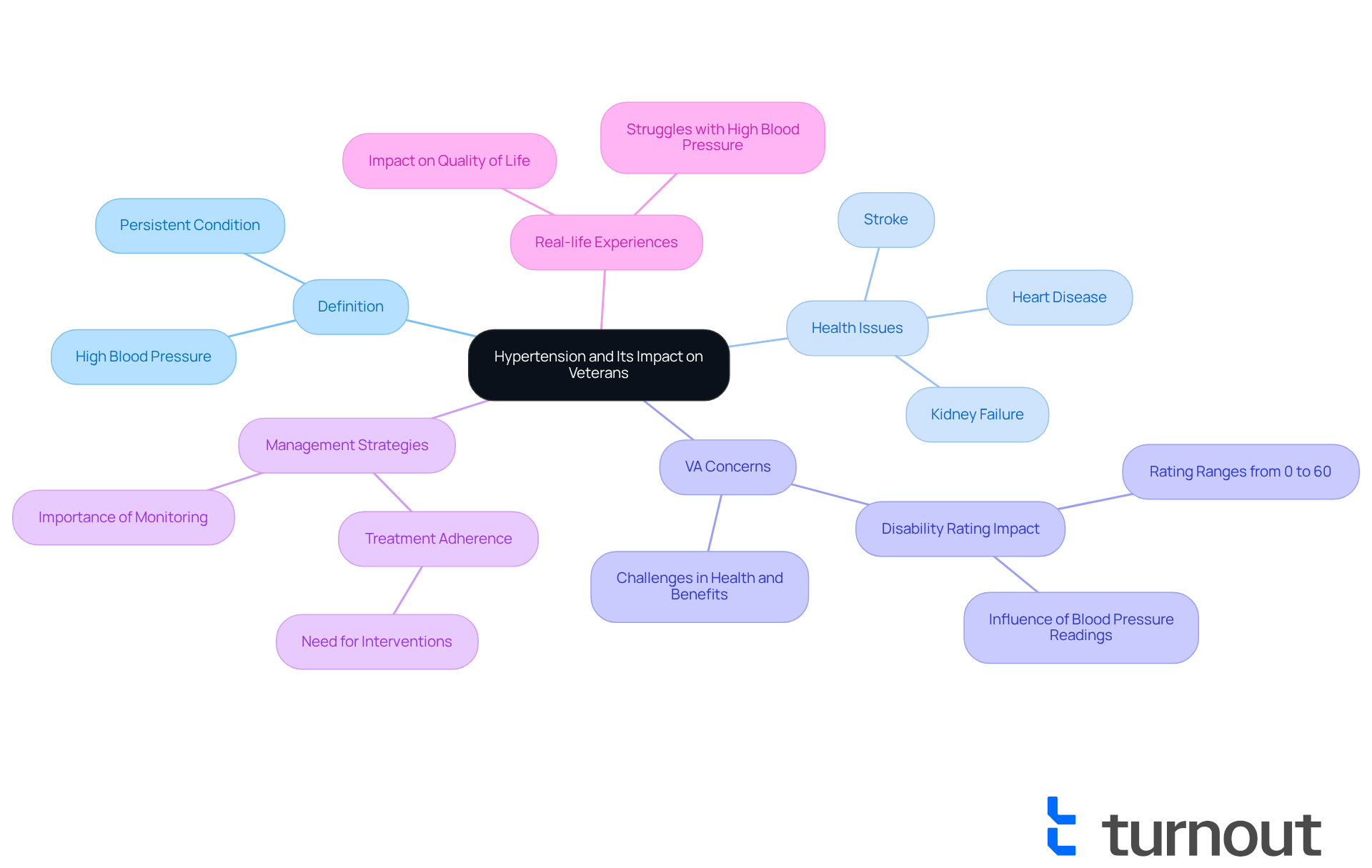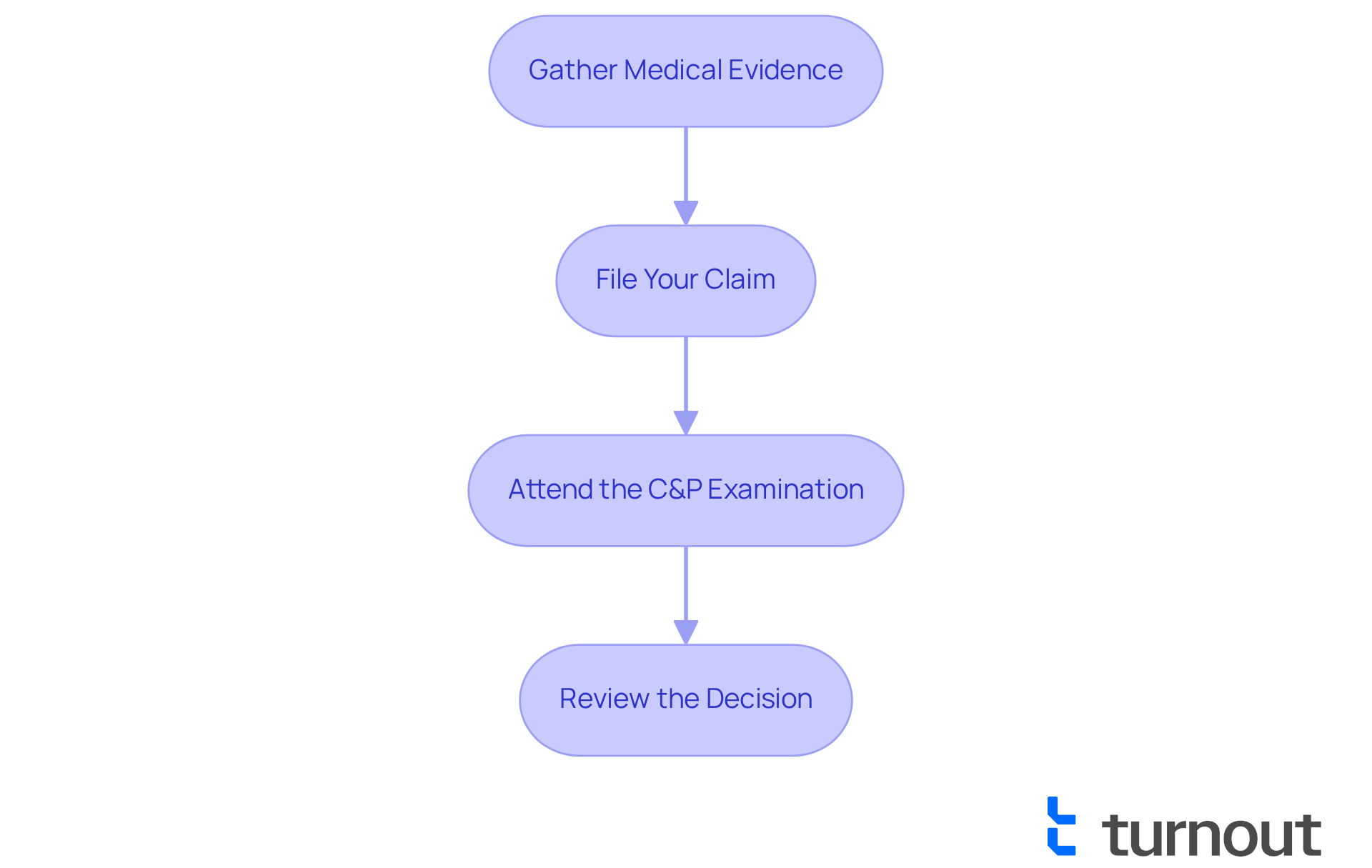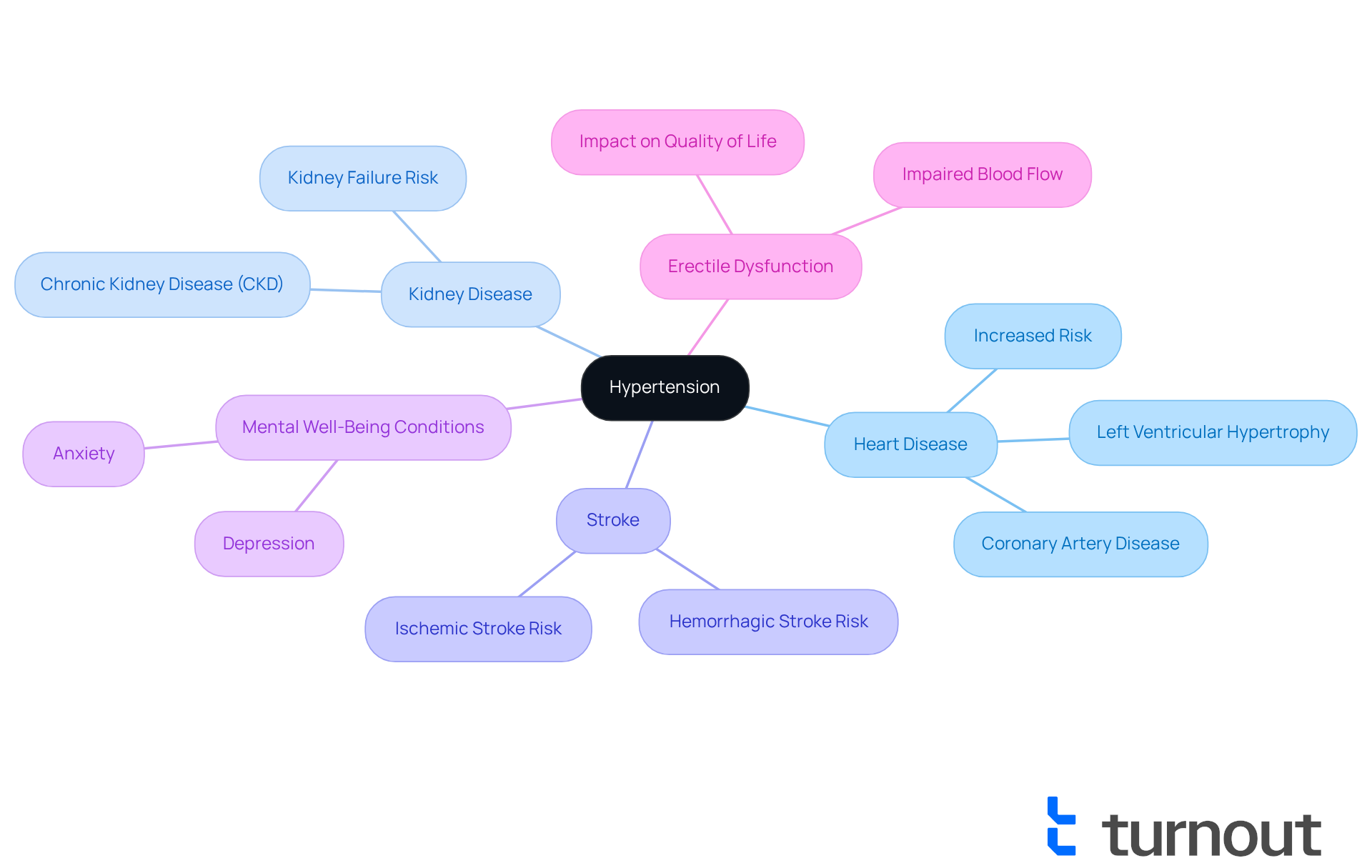Overview
This article seeks to shed light on how high blood pressure, or hypertension, can significantly affect veterans' benefits through the VA rating system. We understand that navigating this system can be challenging, especially when dealing with the serious health complications that hypertension can cause.
Veterans must provide comprehensive medical evidence to establish a service connection for their condition. This can feel overwhelming, but it's an essential step that influences not only their disability ratings but also their eligibility for additional benefits. Remember, you are not alone in this journey; many have faced similar struggles.
By understanding the requirements and gathering the necessary documentation, veterans can take proactive steps toward securing the benefits they deserve. We’re here to help you through this process, ensuring that you receive the support you need.
Introduction
Hypertension is not just a medical condition; it represents a significant health concern that impacts millions, including many veterans. We understand that the persistent nature of high blood pressure can lead to severe complications, such as heart disease and stroke. This makes it crucial for former service members to grasp how their condition influences their eligibility for VA benefits.
As veterans navigate the complexities of the VA rating process, it's common to feel overwhelmed by the challenge of proving the connection between their hypertension and military service. How can you effectively manage your health while ensuring you receive the benefits you deserve? This article delves into the nuances of high blood pressure VA ratings. We offer essential insights and guidance to help veterans improve their health outcomes and secure the support they need. You are not alone in this journey; we're here to help.
Define Hypertension and Its Impact on Veterans
Hypertension, often known as high blood pressure, is a persistent condition where blood pressure against the artery walls remains consistently elevated. For our former service members, this can lead to , including:
- Heart disease
- Stroke
- Kidney failure
The VA recognizes high blood pressure as a significant wellness concern, particularly for veterans who may have faced various stressors during their service. Understanding the seriousness of is essential, as it can influence the disability rating assigned by the VA, which ranges from 0% to 60% based on blood pressure readings and the need for medication. might also face additional challenges that complicate their health and benefits eligibility.
Recent studies indicate a 7% decline in . This highlights the challenges many individuals face in controlling their high blood pressure. Unmanaged hypertension claims over 10 million lives each year, underscoring the gravity of the issue and its impact on former service members. Experts in veteran well-being emphasize the importance of to prevent further complications. For example, increased mortality rates from related conditions have been observed, reinforcing the necessity for .
Real-life experiences illustrate the struggles faced by former military personnel. Many wrestle with the lasting effects of high blood pressure, which can exacerbate existing medical conditions and reduce their quality of life. Addressing high blood pressure VA rating not only enhances personal health outcomes but also contributes to the overall well-being of those navigating the complexities of the VA benefits system. As health specialists have noted, effectively managing high blood pressure is crucial for improving health outcomes and ensuring that former service members receive the benefits they deserve.

Navigate the VA Disability Rating Process for Hypertension
Navigating the process for hypertension can feel overwhelming. We understand that you may have concerns about your health and the . Here are some compassionate steps to guide you through this journey:
- : Start by collecting all relevant medical records that document your . This includes blood pressure readings and treatment history. Remember, having comprehensive evidence can strengthen your claim for a high blood pressure VA rating.
- : When you're ready, submit your claim for disability compensation through the VA using VA Form 21-526EZ. Ensure that all medical evidence is included to support your claim. You're taking an the help you deserve.
- Attend the : The VA may require a C&P exam to evaluate your high blood pressure VA rating. It's common to feel anxious about this process, but be prepared to share detailed information about your condition and how it impacts your daily life. This is your opportunity to express your needs.
- : After your claim is processed, take the time to review the VA's decision carefully. If you disagree with the rating assigned, remember that you have the right to appeal. You are not alone in this journey, and we’re here to help you every step of the way.

Prove Service Connection: Essential Documentation and Evidence
Establishing a can feel overwhelming, but we’re here to help. Veterans must compile essential documentation and evidence, including:
- Service Treatment Records: These documents should indicate any diagnosis or treatment of elevated blood pressure during or shortly after military service, which is essential for determining a .
- : A letter from a qualified healthcare provider is crucial, as it connects your hypertension to your military service. This letter must express that your situation is 'at least as likely as not' caused by your service, using clear language that indicates a probability of at least 50% that the issue is related to military service. A well-crafted nexus letter can significantly enhance the likelihood of a successful claim, as it serves as a in demonstrating the connection between your current health issues and your service. Many denials occur because the medical connection between service and disability wasn't clearly established, making a strong nexus letter essential.
- : Include documentation from civilian healthcare providers that detail ongoing treatment for [high blood pressure VA rating](https://disabilitylawgroup.com/blog/va-disability-benefits-for-hypertension), reinforcing the continuity of care and the seriousness of the issue.
- Personal Statements: Written accounts detailing how hypertension impacts your daily life and its connection to your military service can provide valuable context and support for your claim. These statements assist in demonstrating the real-world impacts of your situation, enhancing the persuasiveness of your argument.
We understand that navigating this process can be challenging. who understand the VA claims process can facilitate the creation of effective nexus letters, ultimately improving the chances of receiving the benefits you deserve. Remember, you are not alone in this journey.

Explore Secondary Conditions Linked to Hypertension
Hypertension can lead to various secondary issues that may result in a , making veterans eligible for additional . We understand that managing high blood pressure va rating can be challenging, and it’s important to recognize the conditions that may arise from it. Here are some common :
- : Veterans with high blood pressure face a significantly increased risk of developing heart disease, the most prevalent heart condition in the U.S. This connection can serve as a basis for obtaining a higher high blood pressure va rating. Complications from hypertension, such as left ventricular hypertrophy and coronary artery disease, are both critical factors that can affect the high blood pressure va rating in VA disability assessments.
- Kidney Disease: Chronic high blood pressure can damage the blood vessels in the kidneys, impairing their function and potentially leading to (CKD). Unmanaged high blood pressure va rating can result in , making it crucial to document any kidney-related concerns when applying for VA benefits.
- Stroke: High blood pressure va rating is a major risk factor for stroke, which can have severe implications for a veteran's health and disability. The risk of stroke increases due to the damage high blood pressure inflicts on blood vessels, leading to both ischemic and hemorrhagic strokes. Veterans who have experienced strokes related to high blood pressure va rating may be eligible for elevated disability ratings.
- Mental Well-Being Conditions: The stress and anxiety that come with managing hypertension can lead to , including depression. These issues may also be considered for additional benefits, emphasizing the importance of addressing both physical and mental health in claims related to high blood pressure va rating.
- Erectile Dysfunction: Hypertension can impair blood flow, resulting in difficulties achieving or maintaining an erection. This condition is significant and should be reported, as it may qualify veterans for additional benefits.
We encourage veterans to carefully document any additional health issues and discuss them with their healthcare providers. This ensures that these matters are included in their VA claims. Establishing a clear connection between high blood pressure va rating and these secondary issues is essential for optimizing potential benefits. A strong from a qualified provider can help demonstrate that the high blood pressure va rating likely led to or worsened another health issue.
Significantly, 48.1% of U.S. adults experience elevated blood pressure, highlighting the widespread nature of this condition and its relevance among former military personnel. Additionally, with hypertension and a secondary condition if sufficient evidence is provided. Remember, you are not alone in this journey, and we’re here to help.

Conclusion
Understanding high blood pressure and its associated VA rating is crucial for veterans seeking benefits. We recognize that hypertension not only poses significant health risks, such as heart disease and stroke, but it also affects the support veterans can receive from the VA. Establishing a proper VA rating for hypertension involves gathering comprehensive medical evidence, submitting claims, and potentially appealing decisions. This process is essential to ensure that veterans receive the recognition and assistance they truly deserve.
Throughout this article, we highlight key insights that emphasize the importance of documenting service connections, understanding secondary conditions linked to hypertension, and navigating the VA disability rating process. We encourage veterans to compile service treatment records, obtain medical nexus letters, and provide personal statements to strengthen their claims. It’s common to feel overwhelmed, especially given the prevalence of hypertension among veterans, which underscores the need for effective management and advocacy for their health and well-being.
Ultimately, addressing high blood pressure is not just about individual health; it’s about ensuring that veterans receive the benefits they are entitled to for their service. By taking proactive steps in documenting their conditions and understanding the VA's processes, veterans can significantly improve their chances of securing necessary support. Remember, you are not alone in this journey. It is essential for veterans to remain informed and engaged in managing their health while advocating for their rights within the VA system.
Frequently Asked Questions
What is hypertension and how does it affect veterans?
Hypertension, or high blood pressure, is a persistent condition where blood pressure against the artery walls remains consistently elevated. For veterans, this can lead to serious health issues such as heart disease, stroke, and kidney failure.
Why is hypertension a significant concern for veterans?
The VA recognizes high blood pressure as a major wellness concern for veterans, especially those who may have faced various stressors during their service. It can influence the disability rating assigned by the VA, which ranges from 0% to 60% based on blood pressure readings and medication needs.
What are the consequences of unmanaged hypertension for veterans?
Unmanaged hypertension claims over 10 million lives each year and can exacerbate existing medical conditions, reducing the quality of life for former service members. It is associated with increased mortality rates from related conditions.
How has the COVID-19 pandemic affected blood pressure management?
Recent studies indicate a 7% decline in blood pressure management during the pandemic, highlighting the challenges many individuals, including veterans, face in controlling their high blood pressure.
What is the importance of managing high blood pressure for veterans?
Effectively managing high blood pressure is crucial for improving health outcomes and ensuring that veterans receive the benefits they deserve. It helps prevent further complications and enhances personal health outcomes.
How does high blood pressure impact veterans' eligibility for benefits?
Veterans experiencing high blood pressure may face additional challenges that complicate their health and benefits eligibility. Addressing their hypertension can contribute to navigating the complexities of the VA benefits system.




